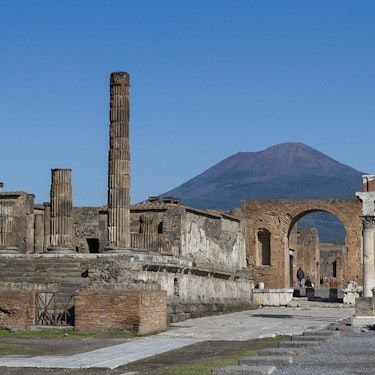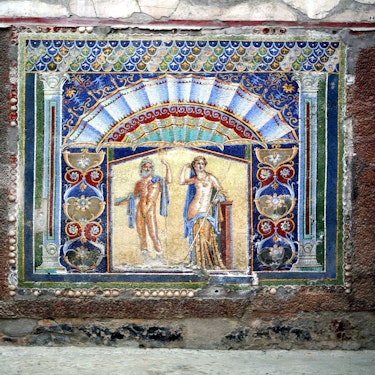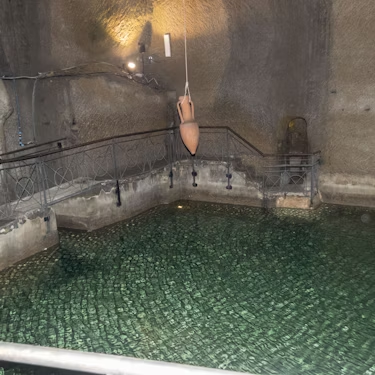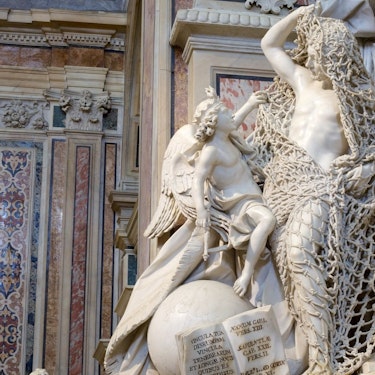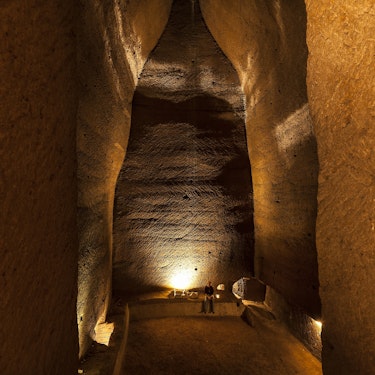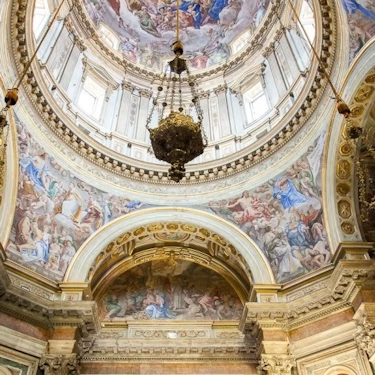More about: 6 Best Day Trips to Pompeii and Herculaneum from Naples
For many, Naples is Pompeii, even though the ruins of Pompeii and Herculaneum are actually located in the surrounding area. It is true that there is a lot to do and see in Naples, but given their proximity, you cannot miss a trip to these ruins, which are a truly impressive archaeological treasure.
In 79 AD, Mount Vesuvius erupted and destroyed the cities of Pompeii and Herculaneum, leaving behind human remains that did not even have the slightest chance of escape. Today, after many excavations, it is possible to admire the ruins of these cities. If you are in Naples, there is no excuse: Pompeii and especially Herculaneum are very close by, so you can easily come and go.
1. 1-day excursion to Pompeii and Herculaneum

Yes, it is possible: if you are short on time and don't want to miss anything, you can visit Pompeii and Herculaneum in a single day. Generally, excursions are planned to go to Pompeii first in the morning because it is the furthest town, and then to Herculaneum in the afternoon, returning to Naples before sunset.
This is one of the most popular packages because one day is enough time to get the best of both sites.
The duration of tours to Pompeii varies greatly, but with a guide everything is usually much more compact. In Herculaneum, the tour is shorter.
Some of these tours include lunch, but I recommend checking when you make your reservation.
Generally, the tours pick you up at your hotel or start from central points in Naples and from there, you travel by air-conditioned bus to Pompeii and Herculaneum.
This option is for early risers, as the buses are often waiting at 8 a.m. to be the first to arrive at the ruins.
Details of interest
- Approximate price: between £60 and £70, depending on whether lunch is included.
- Travel time: 25 minutes to Pompeii, 15 minutes to Herculaneum
- Advantages of this option: you can see both ruins in a single day
- Disadvantages of this option: the tour can be a bit rushed, especially in Pompeii
2. One day for Pompeii, another for Herculaneum

Now, if you have time, my advice is to take it easy and spend one day exploring Pompeii and another day exploring Herculaneum. They may seem very similar and not worth spending so much time on, but I promise you they are not, because this is something you will remember for the rest of your life.
There are tours for tourists that pick you up and drop you off in Naples in comfortable buses. But if you want to go on your own and follow your own schedule, then this is your best option. There is public transport, via the Circumvesuviana train line, which can drop you off one day in Pompeii and the other in Herculaneum.
The visit to Pompeii can easily take six or seven hours. Therefore, I recommend leaving it for the first day and even arranging your meals in the vicinity of the site.
Herculaneum is smaller, so you can spend about three hours there, although you can also explore the surrounding area. It is best to spend the night in Naples and continue the adventure the next day, as Herculaneum is very close to the city.
Details of interest
- Approximate price: around £60, including entrance fees and meals
- Travel time: 40 minutes to Pompeii, 25 minutes to Herculaneum
- Advantages of this visit: you will spend more time at each archaeological park
- Disadvantages of this tour: you need to set aside at least a day and a half, which can be difficult if you have a busy schedule
3. Combined excursion with the Amalfi Coast
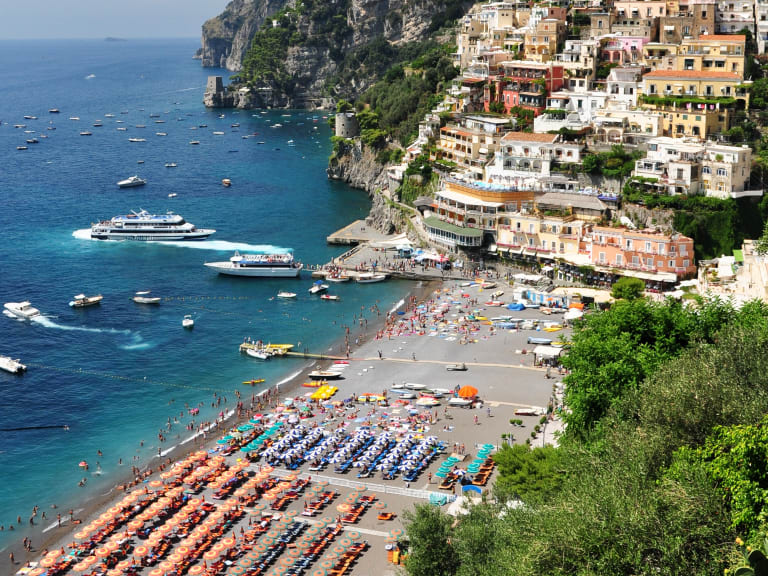
Let's see: do you remember those traditional postcards of Italy that always show a cluster of houses and buildings huddled on a hill near the coast? Well, many of them are among the things to see near Naples, as there are numerous tours that visit Pompeii and Herculaneum and also include excursions to the Amalfi Coast and Sorrento, where you can see those beautiful seaside buildings.
You should know that this is a fast-paced tour, as it is usually done in a single day. The idea is to visit Herculaneum and Pompeii in the morning and then take the same bus to see the best of the Amalfi Coast, a UNESCO World Heritage Site.
The best places to visit in this area are the towns of Amalfi and Positano, which the tour you book will definitely take you to.
Although there won't be much time on this excursion, you should know that it is a trip designed for history lovers. In Pompeii and Herculaneum, you can learn about the region's Roman past, while in Amalfi, in addition to enjoying the beautiful scenery, you can learn about its past as a dominant maritime republic in the Mediterranean Sea.
These excursions usually include food and refreshments, as well as transport, and leave very early in the morning.
Details of interest
- Approximate price: around £120 with everything included
- Travel time: 25 minutes to Pompeii, over 1 hour to the Amalfi Coast
- Advantages of this visit: apart from Pompeii and Herculaneum, you can explore the Amalfi Coast
- Disadvantages of this tour: you won't have time to appreciate everything in great detail
4. The express alternative: Pompeii and Herculaneum in half a day

Short on time? No problem: you have to adapt, and the worst thing would be to miss Pompeii and Herculaneum, so why not visit both in half a day? Whether early in the morning or just after lunch, there is the option of an express tour that takes you to both archaeological sites.
These tours are really for people who want to see everything in the shortest time possible. It is common to take a longer tour of Pompeii, which can last about three hours, and then a shorter one, lasting an hour or an hour and a half, in Herculaneum. This way, you can see both archaeological sites in just half a day.
To time these trips, you will need to book a tour that can take you to and from Naples at the times you need.
Alternatively, you can take the train and check the opening hours of the archaeological parks in advance, as these may vary depending on the season. Make sure you check the train and tour timetables before deciding on one or the other.
Details of interest
- Approximate price: around £60 with a tour, but it can be half that if you go on your own without additional services
- Travel time: 25 minutes to Pompeii, 15 minutes to Herculaneum
- Advantages of this tour: you can see both Pompeii and Herculaneum in half a day
- Disadvantages of this tour: it is a very short time
5. Private excursion to Pompeii and Herculaneum

Would you like personalised attention? No problem: in Pompeii and Herculaneum, you can have it if you book a private tour with a private guide who is an archaeology expert and will give you details about every aspect of the past of these ancient Roman cities.
The problem is that these private tours require time and money, but I can assure you that Pompeii and Herculaneum are worth every penny. In general, when you book a private tour, you will have much more time to spend on the visit, which will last more than three or four hours in Pompeii and at least two hours in Herculaneum.
If you are interested in archaeology and history, make sure that the private tour service includes a guide with extensive knowledge of the subject.
This tour usually picks you up at your hotel and drops you off afterwards, as well as providing transport between Pompeii and Herculaneum in the same way: just for you and your group. If you are travelling as a couple or with your family, this is a great option, as you can split the cost and still enjoy a private tour.
Details of interest
- Approximate price: around £250, including guide
- Travel time: 25 minutes to Pompeii, 15 minutes to Herculaneum
- Advantages of this tour: you will gain a detailed understanding of the archaeology of Pompeii and Herculaneum, without rushing
- Disadvantages of this tour: the cost can be quite high
6. Excursion to Pompeii, Herculaneum and Mount Vesuvius

There are tours that cover other sites in combination, because this whole area has so much to offer. I recommend taking the packages that offer visits to the archaeological ruins of Pompeii and Herculaneum, but if you also want to visit Vesuvius, the only active volcano in continental Europe, I recommend looking into options for hiring a tour that takes you to all these places.
This is very attractive, as it was an eruption of Vesuvius that destroyed Pompeii and Herculaneum.
You will realise as soon as you arrive in Naples: Vesuvius is a fairly large mountain. For this reason, visiting Vesuvius from Naples is very easy.
There are many villages around the volcano and there is even a train line called Circunvesubiana that runs through most of them and avoids the traffic problems caused by the volcano itself.
But it's a great idea to visit Vesuvius, Pompeii and Herculaneum on the same day, especially if you're short on time.
Often, the archaeological parks are visited in the morning and after lunch, which is usually included in the tour, the group heads to Mount Vesuvius, where they can see the crater, which can be reached on foot in about 15 minutes.
Details of interest
- Approximate price: £150, although this depends on whether it includes a guide, meals and entrance fees
- Travel time: 25 minutes to Pompeii, 30 minutes to Vesuvius
- Advantages of this tour: in addition to Pompeii and Herculaneum, you will learn about the cause of their destruction: Mount Vesuvius
- Disadvantages of this tour: some physical effort is required to reach the crater of the volcano
How long do excursions to Pompeii and Herculaneum usually last?

It all depends on which excursion you choose, but my advice is to spend at least a full day exploring the archaeological parks. Although Pompeii and Herculaneum are very close to the city of Naples, they are still outside the city and transport takes some time. When planning your trip, I recommend setting aside a full day to get the most out of your visit.
Of course, if you have less time, that doesn't mean you can't take a shorter tour. It is possible to leave Naples mid-morning and return from Pompeii in the mid-afternoon, spending around five hours there.
The downside of this plan is that it can be difficult to also visit Herculaneum, especially in winter, when it closes at 5 pm.
If you choose a private tour that offers a combined excursion, don't expect it to take less than a full day. To visit Pompeii, Herculaneum and then go to Amalfi or Vesuvius, you'll need at least a day.
Traveller Tip
The opening hours of the archaeological parks vary depending on the season. The later it gets, the longer they stay open. Check the closing time before your excursions.
What can you do when visiting Pompeii?

There is definitely a lot to see and do in Pompeii. When you arrive, you will find a city that was paralysed after a volcanic eruption.
Excavations have uncovered the remains of people who were covered by lava. Families eating, people working or walking around. For all these reasons, it is a very exciting place that deserves a lot of respect when you visit.
The ruins of Pompeii are very large and there is a lot to see. Most of what you will see are buildings, because many of the artistic finds are in the National Archaeological Museum in Naples. Here are some of the places you should not miss.
Roman Forum
All cities in the ancient Roman Empire, such as Pompeii, had a forum. In general, forums were long esplanades where events were held, and the one in Pompeii has been well preserved.
This is an area to contemplate, as there are still original columns and floors that allow you to imagine how big this city once was.
Amphitheatre
Another icon of Roman cities was the amphitheatre. This is probably the ruin in Pompeii that most attracts tourists, as even today it hosts various concerts and events due to its enormous capacity of 20,000 spectators.
Just imagine: if 20,000 people is still a lot today, what must it have been like in the 1st century BC, when it is believed to have been built? If you go with a tour guide, they will surely explain its origins and the activities that took place there.
Lupanar
Not everything was veneration of the gods and power in Roman cities, because there was also a lot of lust, and the Lupanar, Pompeii's ancient brothel, is the best example of this.
This building is a delight for anthropologists and archaeologists, as they have been able to study how brothels worked, see their beds and even the erotic art inside.
House of Faunus
And where did the city's wealthy live? In mansions like the House of the Faun. This was a large house belonging to a wealthy family in Pompeii, which had various works of art, including sculptures and frescoes. In the end, regardless of class, the lava took them all.
And what about Herculaneum?

Like Pompeii, Herculaneum was a city that was destroyed by lava. It was a smaller city, but its inhabitants were apparently more affluent.
If you were struck by the images in Pompeii, you will be even more impressed by Herculaneum, because the ruins are better preserved due to being more deeply buried by lava. You will have the imposing Mount Vesuvius right in front of you and you can also visit it after your tour of the archaeological parks.
Although smaller, Herculaneum will leave you speechless. Many of the remains found were not covered by lava, but were burned by it, leaving only bones. Here are some buildings that you should not miss for anything in the world:
The Fornicis
If you stand at the viewpoint in Herculaneum, you can see a city, even though there is no one there and it is just ruins. Seen from above, it looks like a neighbourhood, but the Fornicis were buildings used to store products that arrived in the city from the port. Many are quite interesting two-storey buildings.
Headquarters of the Augustan priests
In Roman religion, different gods were worshipped, and the headquarters of the Augustan priests was one of those places. This space can be reached at the end of a cobbled street, where you can admire its columns, its plaques dedicated to Emperor Augustus and, in particular, its frescoes made with mosaics.
House of the Neptune Mosaic
For many, the House of the Neptune Mosaic has one of the most precious works of art in all of Ancient Rome: a mosaic depicting the god Neptune with Amphitrite. It is striking to see these buildings because it is evident how far the lava reached and how what remained beneath it was preserved with mosaics.
Tips for a smooth and enjoyable trip to Pompeii and Herculaneum

Visiting Pompeii and Herculaneum is something you will never forget, and I am sure it will be an experience you can share with all your loved ones.
However, among the tips for visiting Pompeii and Herculaneum that you should keep in mind, it is important to know that you are going to visit an archaeological site that is also a kind of cemetery: you will see many corpses, completely blurred by lava, so sensitivity is required.
Although it is an impressive archaeological park, it is not a place to celebrate, so it is best to go with a deep interest in history and to understand how the people who died in these two cities lived.
You should also be aware that it is very sunny and you will be doing a lot of walking, so try to wear comfortable shoes, take plenty of water and apply sunscreen so that you don't get affected at any time.
How much does a trip like this cost?
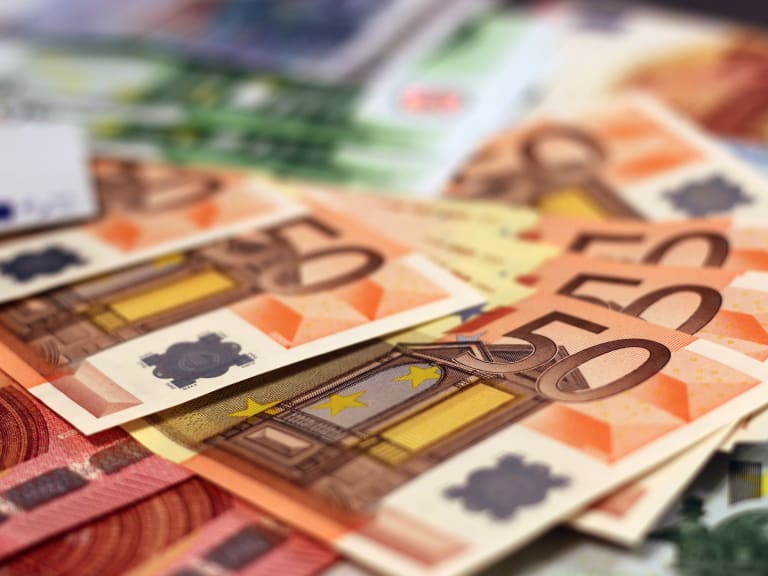
Worried about the cost? Don't worry. If you're already in Naples, you're most of the way there, and it's not far to Pompeii and Herculaneum, so you won't have to pay anything exorbitant.
The most convenient option is to go on a tour that includes all expenses, such as food, entrance fees to the ruins of Pompeii and Herculaneum, and transport. This will save you a lot of money. But if you choose to go on your own, that's also a good decision, because train tickets usually cost around £3.
In general, a tour that includes both archaeological parks of Pompeii and Herculaneum with a tour guide costs around £60. Of course, this will depend on whether it is all-inclusive or if there are additional costs, because admission to the ruins costs £16.
The cost of the packages will also vary depending on how they are offered: independent excursions to Pompeii and Herculaneum are usually more expensive than if you visit both sites in a single day.
If you want to visit the Amalfi Coast on the same day, the cost of the excursion will increase, but you will probably end up saving time and energy. You are sure to be able to choose the best plan for your budget.
Why should you not miss Pompeii and Herculaneum when you are in Naples?

The Roman cities of Pompeii and Herculaneum were destroyed after the eruption of Mount Vesuvius, which is why we can see their ruins today. Naples is the closest city to all these archaeological sites, so if you're there, it would be a shame to miss out on visiting this paradise.
It's an incredible contrast, because in Naples you'll find a modern and traditional city, while in Pompeii you'll feel like you've travelled back in time.
There are many excursions and trains leaving from Naples every day to Pompeii and Herculaneum, so you have nothing to worry about. Instead, there are hundreds of options to choose from to suit your needs.
I recommend setting aside at least one day to see all the ruins of Pompeii and Herculaneum in detail, because I am sure you will never forget it. This entire archaeological park has been declared a World Heritage Site by UNESCO. When you are there admiring every remnant of these cities, you will understand why.
How to get to Pompeii and Herculaneum from Naples?

Want to go on your own to the ruins of Pompeii and Herculaneum? No problem. Fortunately, there are good public transport routes that will take you there by train. My advice is to go first to Pompeii, the furthest ruin, and then to Herculaneum, which is much closer to Naples.
If you are in Naples, it is best to take the Circumvesuviana train. To do this, you need to go to the Circumvesuviana station in Piazza Garibaldi and take the line that takes you to Pompeii.
Follow the route to the Pompei Scavi Villa dei Misteri station. Right in front of you will be the Porta Marina Superiore, one of the entrances to the archaeological park.
Heading towards Herculaneum, you can take the same line towards Naples and get off at Ercolano Scavi station. From there, just exit via 4 Novembre and walk about five minutes to the entrance to the archaeological site. You can't miss it.
Where can I eat during the excursion?

If you go on a private tour with a tour guide, it is very likely that at least lunch will be included. Tour operators often rent out parts of restaurants so you can enjoy delicious Neapolitan food, full of the flavours of the sea and vegetables.
But don't worry if you're going on your own, because if you're wondering where to eat on your trip to Pompeii, you'll find plenty of options. My advice is to eat once you've finished the tour of Pompeii and before you go to Herculaneum.
Since you're in Italy, it would be great to visit the Trattoria Trammiere, where you can taste the best pizzas. At Na Pasta, you can also order traditional, inexpensive pasta to recharge your batteries and continue your tour in the afternoon.
Would you be surprised if I told you that wine has been found among the archaeological remains in Pompeii? Don't miss out on the charm of the ruins: if you need something right next to the archaeological park of Pompeii, then the Caupona restaurant is your best option.
You'll love this place because it's set in ancient Pompeii and serves dishes that they believe were eaten before the eruption in 79 AD. Even the waiters are dressed as Romans! It's great fun.
What are the advantages of taking a guided tour vs visiting Pompeii and Herculaneum on my own?

Although they were once populated cities, today Pompeii and Herculaneum are archaeological sites with a fixed entrance fee and opening hours.
They are large areas where you can admire many buildings that were frozen in time, but that doesn't make them any less of an attraction. That's why it's usually better to book a tour that picks you up, takes you there and guides you while you're visiting the parks.
Outside the parks, there aren't many attractions in the area, although further towards the Amalfi Coast there is a lot to see and you can even take the best tourist buses from Naples, which have routes outside the city.
If you're going to Pompeii and Herculaneum on your own because you want to manage your time and try to save some money, that's also a great option, but you'll probably have to spend more on food, tickets and transport, and you won't have a guide to accompany you.

